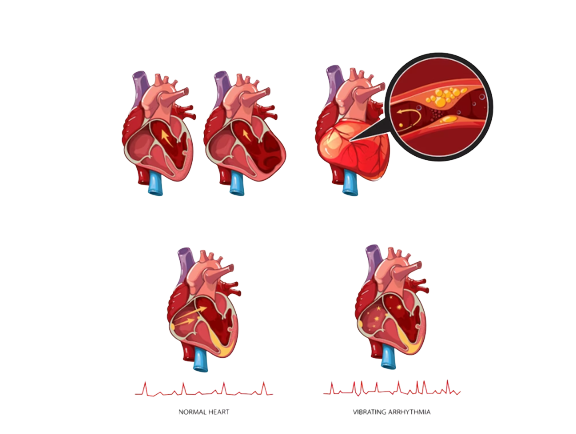Acute Decompensated Heart Failure Treatment
The transition from apparently stable patients with mild pulmonary edema to those experiencing cardiogenic shock represents a distinct clinical scenario. In the case of individuals with limited pulmonary edema, they might initially appear well, exhibiting only minor oxygen requirements and evidence of fluid overload.

Symptoms
Acute Decompensated Heart Failure (ADHF) can manifest with a variety of symptoms, which may include:
Shortness of Breath (Dyspnea): One of the most common symptoms, patients often experience difficulty breathing, especially when lying down or during physical activity.
Fatigue: Patients may feel unusually tired or fatigued, even with minimal exertion.
Fluid Retention (Edema): Swelling can occur in the legs, ankles, and sometimes even in the abdomen due to fluid buildup.
Rapid Weight Gain: Sudden weight gain over a few days may be a sign of fluid retention, often seen in ADHF.
Cough: A persistent cough, which can be dry or produce frothy, pink-tinged sputum, may develop.
Wheezing: Some patients may wheeze, particularly if there is coexisting asthma or chronic obstructive pulmonary disease (COPD).
Chest Pain or Discomfort: Although not always present, chest discomfort or pain can occur due to the strain on the heart.
Tachycardia (Rapid Heart Rate): The heart may beat faster than usual to compensate for decreased cardiac output.
Orthopnea: Patients may find it easier to breathe when sitting upright or propped up with pillows due to reduced lung congestion in this position.
When to access Medical Care
If you’ve been experiencing persistent chest discomfort over an extended period, it is strongly advisable to consult a healthcare professional for a thorough evaluation and assessment.
Ignoring prolonged chest pain can have serious consequences for your health, so it’s essential to seek medical attention to rule out any underlying medical conditions or to receive appropriate care and guidance for your specific situation.
Determinants of risk
Acute Decompensated Heart Failure (ADHF) can be influenced by various risk factors. These factors can increase the likelihood of developing ADHF or exacerbate an existing heart condition. Common risk factors for ADHF include:
Coronary Artery Disease (CAD): A history of blocked or narrowed coronary arteries can lead to heart muscle damage, increasing the risk of heart failure.
Hypertension (High Blood Pressure): Chronic high blood pressure can strain the heart, making it work harder over time and potentially leading to heart failure.
Previous Heart Attack: A previous heart attack can weaken the heart muscle, making it less efficient at pumping blood and increasing the risk of heart failure.
Cardiomyopathy: Conditions that affect the heart muscle, such as dilated or hypertrophic cardiomyopathy, can lead to heart failure.
Valvular Heart Disease: Malfunctioning heart valves can disrupt blood flow, leading to heart failure if left untreated.
Diabetes: Uncontrolled diabetes can damage blood vessels and the heart muscle, increasing the risk of heart failure.
Obesity: Excess body weight can strain the heart and contribute to the development of heart failure.
Smoking: Smoking is a major risk factor for heart disease, including heart failure, due to its detrimental effects on blood vessels and the heart.
Recovery process
Recovery duration varies, contingent on factors like patient characteristics, chosen procedure, and the extent of severity.
Why entrust your care to us?
At Steps 2 Cure, our foundation of trust is built upon several key pillars that ensure your confidence in our services and expertise. Our team comprises highly qualified professionals with extensive experience in their respective fields. Their knowledge and skills enable us to offer you the best possible care and solutions for your medical needs. We understand that each individual is unique, and so are their healthcare requirements.
That’s why we prioritize tailoring our treatments and approaches to your specific circumstances, ensuring that you receive care that is truly designed for you. You are at the heart of everything we do. Your comfort, concerns, and aspirations guide our efforts. Our compassionate approach ensures that you feel valued and supported throughout your healthcare experience.
To commence the treatment procedure, you can start by forwarding your questions via WhatsApp at (+91 9999652964) or by sending an email to care@steps2cure.com. Our team will ensure a swift response to your queries.
Still have a Query?
Your health and peace of mind matter to us, and we’re dedicated to addressing any inquiries you may have with care and expertise. Feel free to reach out.
Subsribe To Our Newsletter
Stay in touch with us to get latest news and special offers.

